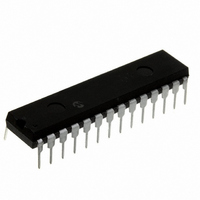PIC16C63-10/SP Microchip Technology, PIC16C63-10/SP Datasheet - Page 2

PIC16C63-10/SP
Manufacturer Part Number
PIC16C63-10/SP
Description
IC MCU OTP 4KX14 PWM 28DIP
Manufacturer
Microchip Technology
Series
PIC® 16Cr
Datasheets
1.PIC16F818-ISO.pdf
(6 pages)
2.PIC16LC62A-04SP.pdf
(337 pages)
3.PIC16C63-04SP.pdf
(8 pages)
Specifications of PIC16C63-10/SP
Core Size
8-Bit
Program Memory Size
7KB (4K x 14)
Oscillator Type
External
Core Processor
PIC
Speed
10MHz
Connectivity
I²C, SPI, UART/USART
Peripherals
Brown-out Detect/Reset, POR, PWM, WDT
Number Of I /o
22
Program Memory Type
OTP
Ram Size
192 x 8
Voltage - Supply (vcc/vdd)
4 V ~ 6 V
Operating Temperature
0°C ~ 70°C
Package / Case
28-DIP (0.300", 7.62mm)
Controller Family/series
PIC16C
No. Of I/o's
22
Ram Memory Size
192Byte
Cpu Speed
20MHz
No. Of Timers
3
No. Of Pwm
RoHS Compliant
Lead Free Status / RoHS Status
Lead free / RoHS Compliant
For Use With
DVMCPA - KIT DVR BOARD EVAL SYSTEM MXDEV1
Eeprom Size
-
Data Converters
-
Lead Free Status / RoHS Status
Lead free / RoHS Compliant
PIC16C63
4. Module: SSP (SPI Mode)
FIGURE 1:
EXAMPLE 1:
5. Module: Timer0
DS80094A-page 2
LOOP BTFSS SSPSTAT,BF
When the SPI is using Timer2/2 as the clock
source, a shorter than expected SCK pulse may
occur on the first bit of the transmitted/received
data (Figure 1).
Work around
To avoid producing the short pulse, turn off Timer2
and clear the TMR2 register, load the SSPBUF
with the data to transmit, and then turn Timer2
back on. Refer to Example 1 for sample code.
The TMR0 register may increment when the WDT
postscaler is switched to the Timer0 prescaler. If
TMR0 = FFh, this will cause TMR0 to overflow
(setting T0IF).
Work around
Follow the following sequence:
a) Read the 8-bit TMR0 register into the
b) Clear the TMR0 register
c) Assign WDT postscaler to Timer0
d) Write W register to TMR0
BSF
GOTO
BCF
MOVF
MOVWF RXDATA
MOVF
BCF
CLR
MOVWF SSPBUF
BSF
SD0
SCK
W register
Write SSPBUF
STATUS, RP0
LOOP
STATUS, RP0
SSPBUF, W
TXDATA, W
T2CON,
TMR2
T2CON,
SCK PULSE VARIATION
USING TIMER2/2
bit0=1 bit1=0 bit2=1 . . . .
AVOIDING THE INITIAL
SHORT SCK PULSE
TMR2ON ;Timer2 off
TMR2ON ;Timer2 on
;Bank 1
;Data received?
;(Xmit complete?)
;No
;Bank 0
;W = SSPBUF
;Save in user RAM
;W = TXDATA
;Clear Timer2
;Xmit New data
6. Module: Timer1
EXAMPLE 2:
EXAMPLE 3:
EXAMPLE 4:
The Timer1 value may unexpectedly increment if
either the TMR1H or the TMR1L register is written.
If Timer1 is ON and then turned OFF, performing
any write instruction with TMR1H as the destina-
tion, may cause TMR1L to increment.
If Timer1 is ON and then turned OFF when
TMR1H:TMR1L = xx:FF, performing any write
instruction with TMR1L as the destination, may
cause TMR1H to increment.
Work around
To preserve Timer1 register values:
a) Read Timer1 register values into “shadow”
b) Perform any write instruction(s) on the
c) Write the shadow register values back into
BSF T1CON, TMR1ON
BCF T1CON, TMR1ON
MOVF TMR1H, 1
TMR1 value before MOVF instruction:
TMR1 value after MOVF instruction:
BSF T1CON, TMR1ON
BCF T1CON, TMR1ON
CLRF TMR1L
TMR1 value before CLRF instruction:
TMR1 value after CLRF instruction:
(TMR1IF is not set.)
BSF T1CON, TMR1ON
BCF T1CON, TMR1ON
MOVF TMR1H, 1
TMR1 value before MOVF instruction:
TMR1 value after MOVF instruction:
registers.
shadow registers.
the Timer1 registers.
TMR1H:TMR1L = FF:FF
TMR1H:TMR1L = FF:00
TMR1H:TMR1L = FF:FF
TMR1H:TMR1L = 00:00
TMR1H:TMR1L = 3F:00
TMR1H:TMR1L = 3F:01
:
:
TMR1L INCREMENT
(CASE 1)
TMR1L INCREMENT
(CASE 2)
TMR1H INCREMENT
2001 Microchip Technology Inc.










